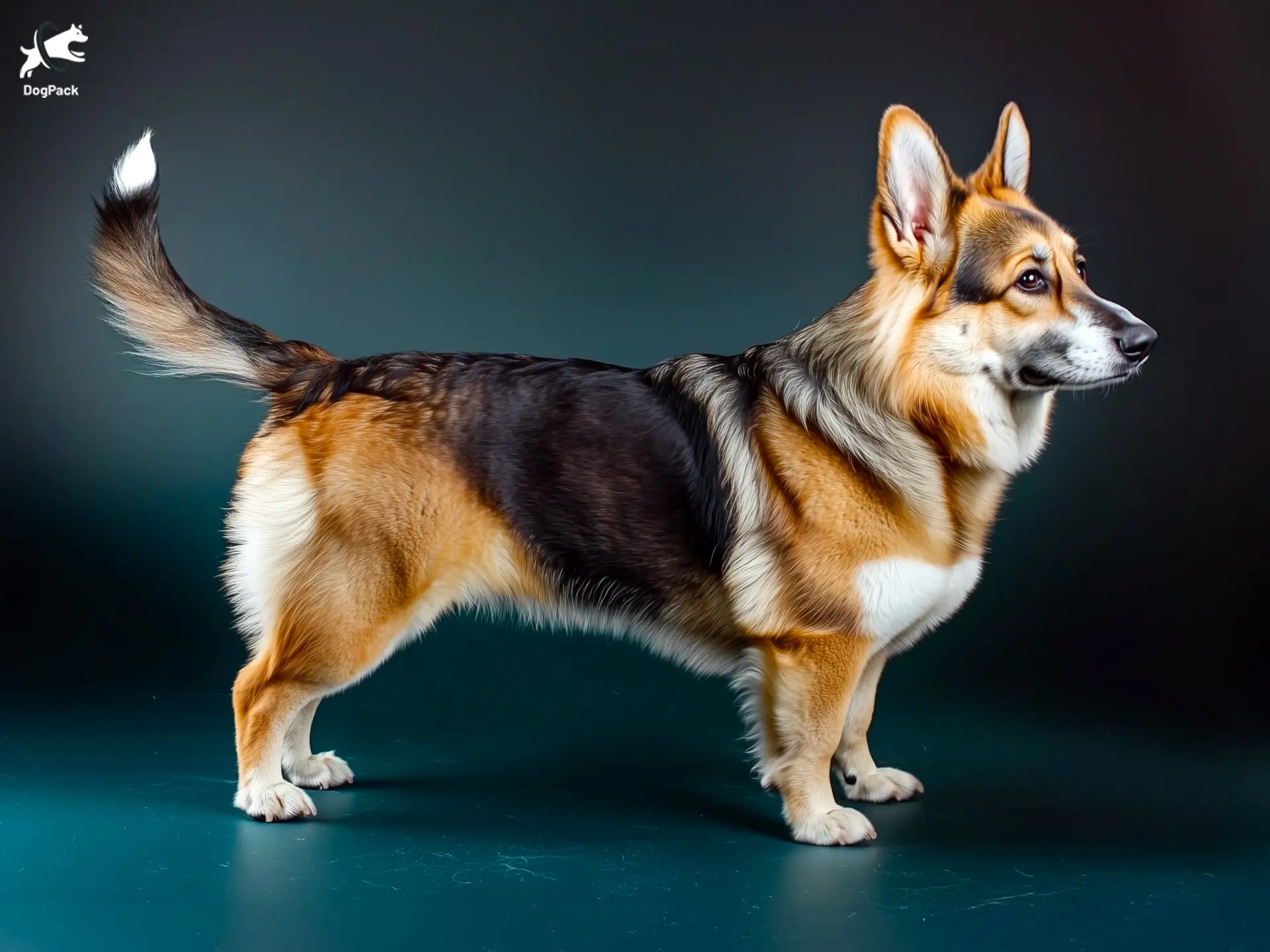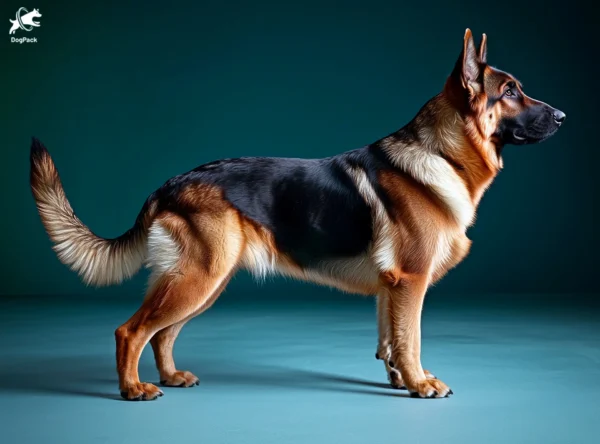Corman Shepherd Dog Breed Info & Overview
The Corman Shepherd, a unique mix of the intelligent German Shepherd and the playful Corgi, is a medium-sized dog with a compact build and a big heart. Known for its loyalty, energy, and affectionate personality, this hybrid makes an excellent companion for active families. With the German Shepherd’s dedication and the Corgi’s spirited charm, the Corman Shepherd is a devoted and lively addition to any home.
Characteristics
Pictures
Breed History
The Corman Shepherd is a relatively new designer breed, combining the steadfast German Shepherd with the spirited Pembroke Welsh Corgi. This hybrid emerged in the United States, aiming to blend the intelligence and protective nature of the German Shepherd with the compact size and friendly demeanor of the Corgi.
While there’s no precise record of when the Corman Shepherd first appeared, the rise in popularity of designer breeds in the late 20th century likely contributed to its development. Breeders sought to create a dog that possessed the best traits of both parent breeds, making an ideal companion for various lifestyles.
Though not recognized by major kennel clubs, the Corman Shepherd has garnered a dedicated following. Owners appreciate the breed’s unique combination of characteristics, resulting from its distinguished lineage. Understanding the histories of both parent breeds provides insight into the qualities the Corman Shepherd exhibits today.
Temperament, Personality
The Corman Shepherd is known for its affectionate and loyal nature. They form strong bonds with their families and are often eager to please. This breed inherits the German Shepherd’s protective instincts, making them vigilant watchdogs who are attentive to their surroundings.
With a playful streak from the Corgi side, Corman Shepherds are energetic and enjoy interactive play. They get along well with children, especially when socialized early, but their herding instincts may lead them to nip at heels during play. Supervision is recommended when they’re around younger kids.
Strangers may be met with caution initially, but proper socialization helps them become more accepting. They can coexist peacefully with other pets if introduced properly. Overall, the Corman Shepherd’s temperament makes them a delightful addition to active households that can provide the attention they crave.
Physical Characteristics
Physically, the Corman Shepherd often sports a unique blend of its parent breeds’ features. They typically have the elongated body and shorter legs of a Corgi, combined with the facial features and coat markings of a German Shepherd. This combination results in a distinctive and endearing appearance.
Their coat is usually double-layered, dense, and medium in length, providing protection in various weather conditions. Common coat colors include black and tan, sable, and sometimes even a mix of colors from both parents. Their eyes are expressive, reflecting their intelligent and alert nature.
Weighing between 30–70 pounds (14–32 kg) and standing 12–15 inches (30–38 cm) tall, the Corman Shepherd is a medium-sized dog with a sturdy build. Their compact size makes them suitable for various living environments, provided they receive enough exercise to channel their energy.
Health Issues
The Corman Shepherd is generally a healthy breed but can inherit certain health issues from its parent breeds. Common concerns include hip dysplasia, a joint condition that can affect mobility. Regular veterinary check-ups and maintaining a healthy weight can help mitigate this risk.
They may also be prone to degenerative myelopathy, a spinal cord condition common in Corgis and German Shepherds. Keeping an eye out for early signs and providing appropriate care is crucial. Eye conditions like progressive retinal atrophy might occur, so routine eye examinations are advisable.
Dental health is another area to monitor. Regular teeth brushing and dental chews can prevent periodontal disease. By staying proactive about health care, owners can ensure their Corman Shepherd enjoys a long, happy life. Consult reputable sources like the American Kennel Club for detailed health information.
Grooming Needs
Corman Shepherds have moderate grooming needs due to their double coat, which sheds seasonally. Weekly brushing helps reduce shedding and keeps their coat healthy by distributing natural oils. During heavy shedding periods, more frequent brushing may be necessary to manage loose hair.
Bathing should be done as needed, typically every few months, unless they get particularly dirty. Over-bathing can strip the coat of essential oils, leading to skin dryness. Use dog-specific shampoos to maintain proper skin pH balance.
Don’t forget routine care like trimming nails, cleaning ears, and brushing teeth. Their ears should be checked regularly for signs of infection or buildup. Establishing a grooming routine early on will make the process smoother for both the Corman Shepherd and the owner.
Exercise Requirements
High energy levels mean the Corman Shepherd requires ample daily exercise. Aim for at least 1–2 hours of physical activity to keep them happy and prevent boredom-related behaviors. Activities can include brisk walks, runs, fetch, and agility training to engage both their mind and body.
Mental stimulation is equally important due to their intelligence. Puzzle toys, obedience training, and interactive games help satisfy their cognitive needs. Without sufficient exercise and mental engagement, they may become destructive or develop behavioral issues.
This breed thrives in homes with access to a yard or nearby parks. While they can adapt to various living situations, providing opportunities for them to burn off energy is essential. Active families or individuals who enjoy outdoor activities will find the Corman Shepherd a compatible companion.
Training Tips
Training a Corman Shepherd can be a rewarding experience thanks to their intelligence and eagerness to please. Start obedience training early to establish good habits and reinforce desired behaviors. Positive reinforcement techniques work best, using treats and praise to motivate them.
Consistency is key, as they may inherit some stubbornness from the Corgi side. Short, engaging training sessions prevent them from becoming bored. Socialization from a young age helps them become well-adjusted adults comfortable with various people and environments.
Be mindful of their herding instincts, which might lead them to nip or chase. Redirecting this behavior through training and providing appropriate outlets is important. Enrolling in puppy classes or working with a professional trainer can offer additional guidance tailored to the Corman Shepherd’s needs.
Nutrition, Diet
Feeding a Corman Shepherd requires attention to their specific dietary needs. A balanced diet rich in high-quality protein supports their active lifestyle. Portion sizes should be appropriate for their weight and activity level, typically around 2–3 cups of dry kibble split into two meals per day.
Since they are prone to obesity if overfed, monitoring calorie intake is crucial. Avoid free-feeding and be cautious with treats, using them primarily for training rewards. Incorporating omega-3 fatty acids can promote a healthy coat and skin.
Consulting with a veterinarian can help determine the optimal diet plan tailored to your Corman Shepherd’s age, weight, and health status. Fresh water should always be available. Specialized diets may be necessary if they develop food sensitivities or health conditions.
Adoption, Breeders
When considering adding a Corman Shepherd to your family, it’s important to seek reputable sources. Adoption is a wonderful option; check with local shelters or rescue groups that may have this hybrid available. Organizations like Petfinder can help locate adoptable dogs in your area.
If opting for a breeder, ensure they prioritize health and ethical practices. Ask for health clearances of both parent breeds to avoid hereditary issues. Visiting the breeder and seeing the breeding environment can provide assurance of their credibility.
Avoid puppy mills or breeders who cannot provide detailed information about the puppy’s background. Connecting with the Designer Breed Registry may offer additional resources. Responsible sourcing contributes to the well-being of your future pet and the breed as a whole.
Family Pet?
The Corman Shepherd can make an excellent family pet for households that can meet their exercise and attention needs. Their affectionate nature means they often form strong bonds with family members. They generally get along well with older children who understand how to interact respectfully with dogs.
Due to their herding instincts, supervision around young children is advisable to prevent nipping or herding behavior. Early socialization enhances their compatibility with other pets, including dogs and possibly cats, especially if raised together from a young age.
Their protective instincts make them attentive watchdogs, alerting the family to unusual activities. However, they are not typically aggressive and can be friendly once they recognize that there is no threat. Overall, the Corman Shepherd’s temperament and size can fit well into active family life.
Right For You?
If you’re seeking an energetic, intelligent, and loyal companion, the Corman Shepherd might be the perfect match. They thrive in active households where they receive ample exercise and mental stimulation. Their unique blend of traits from the German Shepherd and Corgi offers a distinctive pet experience.
Consider your ability to commit time to training, socialization, and exercise. They may not be the best fit for sedentary lifestyles or those unable to dedicate attention to their needs. Apartment living is possible if daily exercise requirements are met, but access to outdoor spaces is ideal.
Ultimately, the Corman Shepherd can be a rewarding addition for individuals or families prepared to embrace all aspects of their care. Their affectionate nature and spirited personality can bring joy and companionship to the right home.
Conclusion
The Corman Shepherd combines the best of both worlds—the intelligence and loyalty of the German Shepherd with the playful charm of the Corgi. This energetic hybrid is well-suited for active families or individuals ready to invest time and love into their care. If you’re looking for a unique, devoted companion, the Corman Shepherd might just be the perfect fit for your household.
FAQs
-
How much exercise does a Corman Shepherd need daily?
A Corman Shepherd needs at least 60–90 minutes of exercise daily. Combining walks, playtime, and mentally engaging activities helps meet their high energy levels and keeps them happy and well-behaved in the home.
-
Are Corman Shepherds suitable for families with young children?
With proper socialization, Corman Shepherds can be good family dogs. They are often gentle and loyal, but their herding instincts mean they might try to “herd” children, so supervision and training are recommended around young kids.
-
Do Corman Shepherds require any specific diet?
Corman Shepherds benefit from a balanced diet high in protein to support their active lifestyle. Including joint-supporting nutrients like omega-3 fatty acids can also help, especially given their mix of breeds, which may predispose them to joint issues.
-
How do Corman Shepherds handle new environments or travel?
Corman Shepherds generally adapt well to new environments if introduced positively. Early socialization to different places and situations can make them good travel companions, though regular breaks during long trips are important for their comfort.
-
Are Corman Shepherds easy to train for first-time dog owners?
While intelligent, Corman Shepherds can be somewhat stubborn due to their independent streak. First-time owners may need patience and consistency, using positive reinforcement to encourage responsiveness. Basic obedience classes can be beneficial.
Breed Ratings
The Corman Shepherd is highly intelligent, inheriting sharp minds from both parent breeds, making training an engaging experience.
They are playful and enjoy interactive games, especially those that challenge them mentally and physically.
With high energy levels, they thrive on regular exercise and active lifestyles, needing plenty of daily activity.
Expect moderate to high shedding due to their double coat; regular grooming helps manage loose hair.
They have a moderate prey drive; early training can mitigate tendencies to chase smaller animals.
Grooming requires a moderate effort with weekly brushing and seasonal attention during heavy shedding periods.
Their eagerness to please and intelligence make them highly trainable with consistent, positive methods.
They prefer companionship and may experience separation anxiety if left alone for extended periods.
Moderate barkers, they may alert you to strangers or unusual noises but are not excessively vocal.
Low drooling tendencies make them a cleaner choice for indoor living.
Generally friendly with other dogs, especially when socialized early, they enjoy canine companionship.
With proper care, they are generally healthy but can be prone to certain hereditary conditions from parent breeds.













